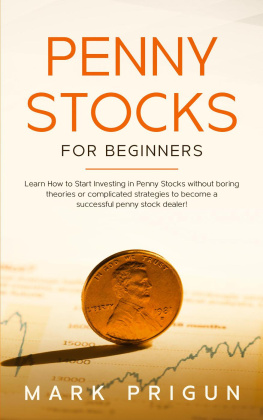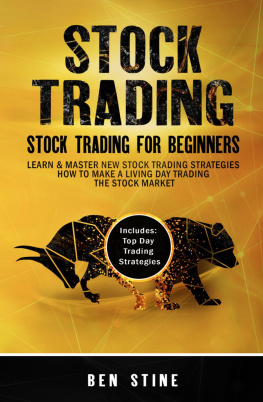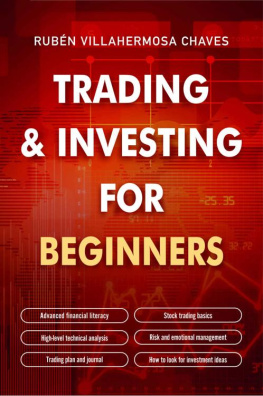Congratulations on getting this book and I thank you for doing so. I can assure this will just be the very beginning of your exciting journey venturing into the complicated world of investments.
This book comprises of several chapters which will teach you the fundamentals you need to know about investing in stocks.
Chapter 1, 2, and 3 explain the basics so that you will have a better understanding of what investing in stocks is all about.
Chapter 4 lays down the strategies that you can use to earn a profit. These strategies will significantly increase your rate of success and turn the odds in your favor.
Finally, Chapter 5 goes in details about the best practices that you need to observe to be successful. It also includes the common pitfalls that you should avoid. This chapter aims to further increase your chances of success and help minimize your losses.
There are plenty of books on this subject on the market, thanks again for choosing this one over the others! Every effort was made to ensure it is full of as much useful information as possible. Happy Trading!
Chapter 1
Getting into the Playground
Before you study the ways on how you can turn the stock market into a goldmine, you should first have a good foundation of the basics of investing in stocks. One thing to always keep in mind, when we are talking about financial markets, there is no hard and fast rule sometimes there are sensible reasons behind every trade, sometimes there are speculations that make very little sense, yet sometimes there are just purely emotions that came into play where fear and greed hooked up. There is no one-size-fits-all philosophy day traders and pure investors believe in different investing horizons, your grandmother and my grandfather could favor different stocks even when given the exact same piece of information. Throughout the book, I will highlight some of the most simplistic concepts and beliefs. If you are new to this subject, you got to start somewhere with an open mind.
Stock Market
A stock market, to say the very least, is a place for buying and selling stocks. It also acts as an indicator of the economic cycle. When the economy is doing well, the prices of stocks tend to increase in the market, generally. However, when the economy is down, you can also expect the prices of stocks to decline, this can be true even for a very good stock. It is also worth noting that the prices of stocks primarily depend on the performance of the business. When a business is doing well, the price of its stocks will also tend to increase; the opposite would happen if the business is not earning well. Of course, there are odd cases where speculators buying into a stock that is not doing well at all, which will result in a high stock price even for a crappy company, but that is another story for another time. Now, the question remains: Why do businesses offer stocks? The reason is that it helps businesses to raise funds in order to finance their projects, whether for the expansion of the business, or for their day-to-day activities, or just for the sake of it to keep their stakeholders happy. Money, after all, is the lifeblood of every business.
Stock
A stock, also referred to as a share , signifies ownership of a company. When you buy stocks from a company, you get to exercise rights of ownership of the company, such as a claim on the companys earnings and assets, as well as voting rights. Take note that there are many kinds of stocks. But, when you hear investors talk about the stock market, they usually refer to common stocks.
Stock Market Index
When people talk about stocks, you may hear them talk about how the market rises or falls in a day. However, when you take a look at the stock market, you may see that not all of the stocks rise or fall on that day. The way to understand this is to know the stock market index, or indices (plural).
There are many stocks listed on the stock exchange. Similar stocks are grouped together and formed an index. The way these stocks are grouped together may be based on capitalization, industry, company size, and other factors. Since they are grouped together, any change in the value of the stocks that belong to a particular index will affect the value of the index. Famous indices in the world are, but not limited to, the following: Dow Jones, Nasdaq, and S&P 500.
Having an index is a good way to sort the different kinds of stocks in the market. After all, the stock market is composed of so many stocks. It will be chaotic if you do not sort similar stocks together. It is also a point of reference for comparison. You can compare the trend of the index value with the trend of the price of particular stocks that belong to that same index. You can also compare one index with another index and see which industry may be a profitable investment.
Since there are countless of stocks in the market, and the index is able to sort all of them out in an orderly way, an index acts as a good representation of the entire market. For example, if you take a look at the index of the IT industry, then you will know the average performance of the stocks in the IT industry. This applies to other industries. Of course, there are other ways to make comparisons depending on how the stocks are sorted in an index.
How the stocks are grouped together determines the type of classification of the index. For example, in a world stock market index, such as in the S&P Global 100, you will find stocks that are found across the world. These are the stocks that come from different regions in the world, such as from Asia and Europe. There is also what is called as national index. As the name implies, this type of index considers the performance of the stock market in a particular nation. You can also find a more specific index that shows the behavior of the stock market on a regional level. An index can also be grouped based on the method used to sort them based on price. In a price-weighted index, the price of each stock is the only thing that is considered to determine the value of the index. Therefore, any change in the value of any of the stocks that belong to the same index will cause a corresponding change to the value of the index concerned. There is also what is referred to as a sector index. This will allow you to benchmark a particular industry or sector. A sector index is formed by assigning a particular industry classification based on the business of a company. Companies that have the same principal business are then grouped together to form a market sector. There are other indices that you can find. Just take note that indices are based on how they are classified. When analyzing the stock market, it is good to study different indices, so that you can have a better understanding of what is really happening in the stock market.











